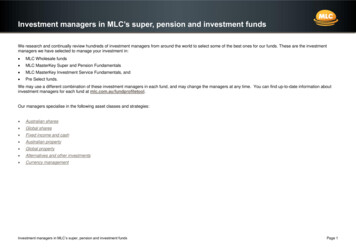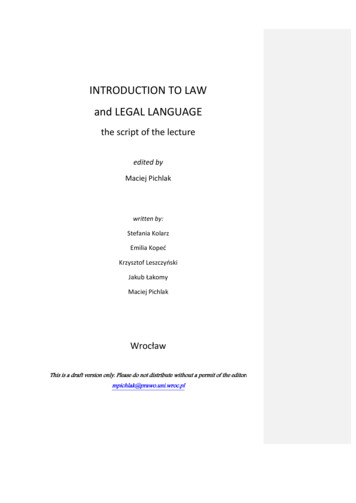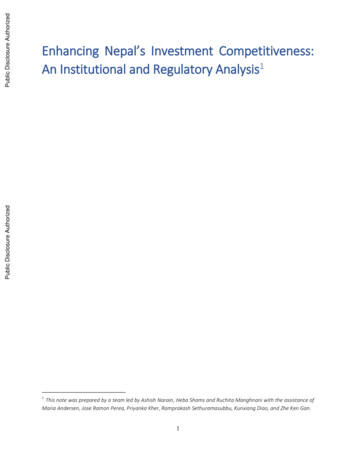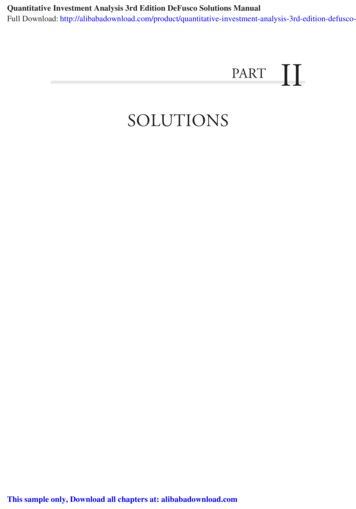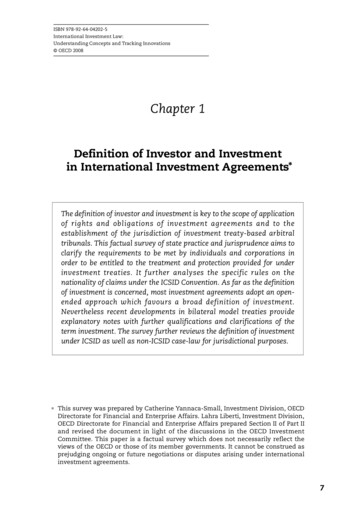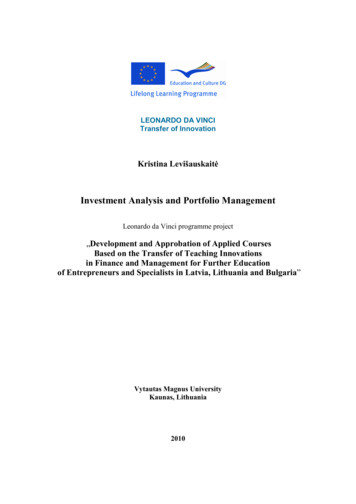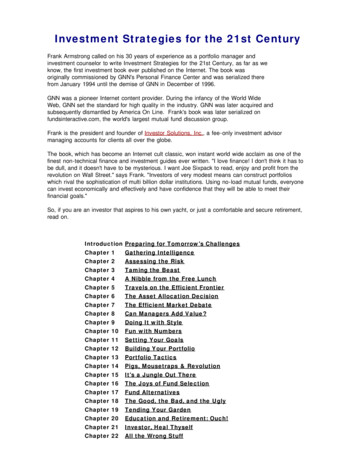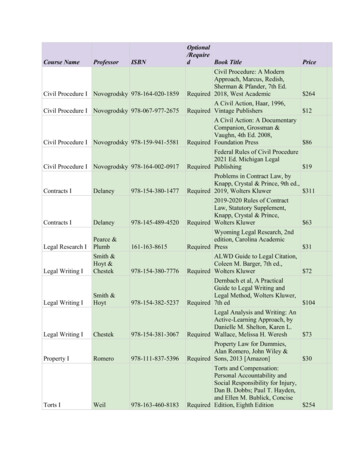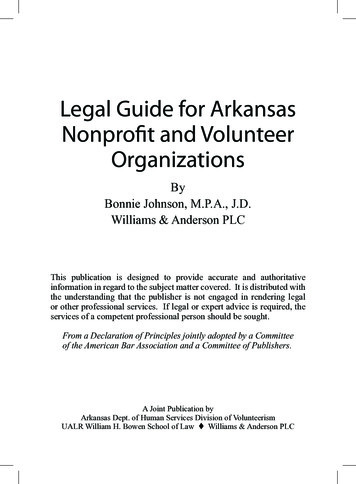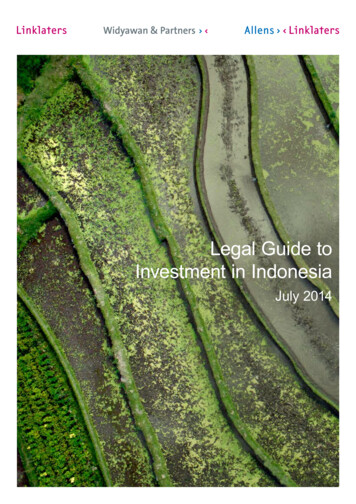
Transcription
Legal Guide toInvestment in IndonesiaJuly 2014
Contents1Indonesia at a glance14.4Changes to investment structure201.1Investment environment24.51.2Economy2Domestic processing and refiningobligation, and export tax201.3Geography25Land221.4Indonesia’s challenges35.1Introduction231.5Political system35.2Leasehold231.6Structure of the laws55.3Building rights241.7International treaties55.4Right of use242Foreign Investment66Infrastructure / PPPs252.1Overview76.1Plan for economic development262.2Direct foreign investment76.2Relevant legislation272.3Indirect foreign investment97Exchange control and lending282.4Limitations on foreign investment107.1Exchange control293Enterprises in Indonesia147.2Currency for transactions293.1Types of corporate enterprises157.3Offshore borrowing293.2Corporate governance167.4Onshore borrowing294Mining178Tax ent anddivestment requirements9.1Introduction33199.2Employment contracts33Divestment procedures199.3Duration of employment334.3Legal Guide to Investment in Indonesia
9.4Form of contracts3312.2Choice of law469.5Termination of employment3412.3Language requirements469.6Working hours3412.4Arbitration489.7Wages and leave entitlements3412.5Tribunal selection489.8Internal labour rules3512.6Domestic arbitral awards489.9Bipartite cooperation institute3512.7Foreign arbitral awards499.10Trade unions3512.8Arbitral rules499.11Employing foreigners3512.9Enforcement ional health and safety3713.1Bankruptcy5110Intellectual 10.2Trade marks4014.1Overview5310.3Copyright4114.2Import restrictions5310.4Patents4214.3Export restrictions5410.5Other IP protection421511Environmental regulation43Assisting your Investmentin Indonesia5511.1General4411.2Mining4412Dispute resolution4512.1Foreign judgments46Legal Guide to Investment in Indonesia
1Indonesia at a glance
1.1Investment environmentIndonesia, with its abundance of natural resources, access to global mobility through its strategic locationalong major sea lanes offers investors significant opportunities. Other influential factors include: it is the fourth most populous country in the world, with a population in 2013 of 251.1 million, according tothe United States Census Bureau, and a projected population of 255.5 million in 2015, according to theBPS, Indonesia’s official statistical organisation; and in 2013, its GDP was at 867.5 billion with an annual growth rate of 5.78%, compared to a GDP in 2012 ofUS 878 billion and an annual growth rate of 6.2%.1.2EconomySince Indonesia gained independence nearly seven decades ago, its economy has moved from atraditionally agricultural-based one, to a more mixed economic base, with increased economic activity in themanufacturing and service industries. Currently, Indonesia ranks as the world’s 17th largest economy.Indonesia is a major producer of a broad range of commodities. It is the largest producer and exporter ofpalm oil in the world, and is the second largest producer of cocoa, tin and natural rubber. It provides 12 percent of the world’s nickel reserves and ranks seventh in the world’s reserves of bauxite. It is also a largeproducer of steel, copper and fisheries.Indonesia aims to be among the top 10 global economies by 2025. According to Indonesia’s Master PlanAcceleration and Expansion of Indonesia Economic Development 2011-2025 (the MP3EI), Indonesia’seconomic transformation into a developed country will involve developing the regional economic potential insix economic corridors (Sumatra, Java, Kalimantan, Sulawesi, Bali – Nusa Tenggara and Papua – MalukuIslands), strengthening national connectivity locally and globally, and strengthening human resourcescapability, science and technology. Indonesia is focusing on developing eight key programs to reach itstarget by 2025. They are: agriculture, mining, energy, industrial, marine, tourism, telecommunicationand the development of strategic areas. Following the issue of the MP3EI, the Indonesian Governmenthas implemented, and continues to amend, key legislation, with a view to attracting more investment inthese areas.Japan was recognised as Indonesia’s biggest investor in 2013, investing a total of US 4.7 billion, followedby Singapore (US 4.6 billion) and the US (US 2.4 billion). As one of the fastest growing economies in theworld, Indonesia offers many business opportunities to foreign investors.1.3GeographyIndonesia is located in South-eastern Asia between the Indian Ocean and the Pacific Ocean, and occupiesa total area of 1,904,569 square kilometres, making it the 15th largest country in the world. It is alsothe world’s largest archipelago, with an east to west distance of 5,200 kilometres and a width of 1,870kilometres. It has land borders with Timor-Leste (228 kilometres), Malaysia (1,782 kilometres) and PapuaNew Guinea (820 kilometres).Indonesia has an abundance of natural resources, such as petroleum, tin, natural gas, nickel, timber,bauxite, copper, fertile soils, coal, gold and silver.Legal Guide to Investment in Indonesia2
1.4Indonesia’s challengesAlthough Indonesia’s economic potential is strong, it continues to face a number of challenges. Corruption isa significant impediment to Indonesia’s development. In 2013, Transparency International scored Indonesia32 out of 100 on a scale from 0 (highly corrupt) to 100 (very clean), although this score has steadilyimproved in recent years. In addition, the overall ease of doing business in Indonesia in 2014 decreased byfour points, from a ranking of 116 out of 189 economies to 120, according to the ranking given by the WorldBank Group.Bureaucracy is considered by many international investors to be a barrier to investing in Indonesia.Disharmony between regulations made by regulators at the central government and at the regional levelis considered to be a key source of Indonesia’s bureaucracy-related issues. The Government’s regionalautonomy policy has led to a proliferation of regional regulations that are not always consistent with thecentral legislation. In addition, officials in the relevant industry sector are given significant discretionarypowers, which often leads to further regulatory uncertainty. Compounding this is general concern over theefficiency of contract enforcement. Clearer regulations, relaxation of restrictions affecting foreign investorsand streamlining permit applications would certainly encourage increased participation from internationalinvestors. Given the archipelago nature of Indonesia, insufficient infrastructure is also seen as barrier toinvesting, particularly in the middle and eastern part of Indonesia. On the other hand, the insufficienciesof the infrastructure sector present great opportunities for foreign investors. A PPP model is increasinglypopular among foreign investors, although the Indonesian Government has tended to promote a model thatexcludes support through the issue of government guarantees (see section 6 for more information).Other key challenges that are characteristic of the Indonesian legal system include that: it is not uncommon to find conflicting laws from different authorities and it is often unclear whichregulations are applicable. There is also often a time lag in passing implementing regulations; there is no reliable central source of obtaining comprehensive sets of relevant laws and regulations. It isnot unusual, therefore, for Indonesian legal opinions to be caveated to reflect this; court proceedings are generally lengthy and cumbersome and are likely to take many months, or evenyears, to complete (see section 12 on dispute resolution for more information); and judges are given a high level of discretion in deciding matters. Combined with a lack of sophistication,particularly in some regional courts, this can lead to inconsistency in judicial interpretation.1.5Political systemIndonesia is the third largest democracy in the world after India and the United States. Since the late 1990s,Indonesia has experienced an extended period of political stability, consolidated democratisation andeconomic growth.Executive and legislative branchesIndonesia is a unitary state. The executive branch is headed by a President and Vice President, who aredirectly elected for a five-year term by popular vote. The President and Vice President govern with theassistance of an appointed Cabinet. The People’s Consultative Assembly, or the Majelis PermusyawaratanRakyat (MPR), a 692-member parliament, has the authority to amend and stipulate the Constitution, andinaugurate the elected President and Vice President. The MPR comprises two lower houses:3Legal Guide to Investment in Indonesia
a 560-member House of Representatives (DPR), elected by proportional representation, with theauthority to make legislation, determine the national budget and oversee the implementation of legislationby the Cabinet; and a 132-member advisory body called the House of Regional Representatives (DPD), with fourrepresentatives from each of Indonesia’s 33 provinces.Administrative divisionsIndonesia consists of 33 provinces, five of which have special status. Each province has its own politicallegislature and governor. The provinces are subdivided into regencies (kabupaten) and municipal cities(kota), which are further subdivided into subdistricts (kecamatan), and again, into a village level (eitherdesa or kelurahan). The provinces of Aceh, Jakarta, Yogyakarta, Papua and West Papua have specialstatus, which gives them greater legislative privileges and a higher degree of autonomy from the centralgovernment. For example, the Achenese Government has the right to establish an independent legalsystem; in 2003, it instituted a form of Sharia (Islamic law).Judicial branchThe Indonesian judicial system comprises several types of courts under the oversight of the SupremeCourt (Mahkamah Agung). The Indonesian President appoints judges to the bench of the SupremeCourt. At first instance, civil disputes are heard at a State Court. The next tier of appeal is the High Courtand then, ultimately, the Supreme Court. The Commercial Court deals primarily with bankruptcy andinsolvency matters, although its jurisdiction can also extend to broader commercial matters. Appeals fromthe Commercial Court proceed directly to the Supreme Court. There is also a State Administrative Court(Pengadilan Tata Usaha Negara), which hears administrative law cases filed against the Government ofIndonesia. Religious Courts hear disputes between Muslim citizens relating to marriage, inheritance andproperty donated for religious purposes.Political partiesKey Indonesian political parties include: Golkar (leading party of the Suharto era); Indonesian Democratic Party of Struggle (PDI-P); Greater Indonesia Movement Party (Gerindra); National Awakening Party (PKB); United Development Party (PPP); National Mandate Party (PAN); Prosperous Justice Party (PKS); and Democrat Party (PD, a leading party of Yudhoyono era).Legal Guide to Investment in Indonesia4
1.6Structure of the lawsIndonesian’s commercial legal system is influenced by civil law traditions and customary (adat) law. Dutchpresence in, and colonial occupation of, Indonesia for 350 years has left a legacy of Dutch colonial law,which is reflected in the Indonesian Civil Code, Indonesian Commercial Code and Indonesian CriminalCode. Following independence in 1945, the nation started to establish its own modern Indonesian law,modifying existing Dutch legal principles and drawing from the customary law that existed before Dutchcolonisation. In common with other civil law jurisdictions, judges in Indonesia are not bound by precedent,trusts are generally not recognised and contracts are subject to the principle of good faith.The hierarchy of rules and regulations in Indonesia is outlined under Article 7 of Law No. 10 of 2004 on theFormulation of Law and Regulations:1.1945 Constitution (Undang-Undang Dasar 1945 or UUD’45);2.Law (Undang-Undang or UU) and Government Regulation in Lieu of Law (Peraturan PemerintahPengganti Undang-Undang or Perpu);3.Government Regulation (Peraturan Pemerintah or PP);4.Presidential Regulation (Peraturan Presiden or Perpres); and5.Regional Regulation (Peraturan Daerah or Perda).In addition to the legal instruments above, there are Presidential Instructions or Decrees, MinisterialDecrees and Circulation Letters, which add further detail to Laws and Government Regulations. Importantly,as Indonesia does not adopt a precedent-based legal system, judges applying these laws and regulationsare not obliged to apply previous rulings/decrees on similar matters.1.7International treatiesIndonesia is also party to a large number of international treaties. Under Indonesian law, internationaltreaties take precedence over domestic legislation. To the extent of any inconsistency, international treatiesapply.5Legal Guide to Investment in Indonesia
2Foreign Investment
2.1OverviewThere are two key common forms of foreign investment in Indonesia: direct investment – where the investor invests capital in a new or existing company, in order to establish abusiness or business presence in Indonesia and participate in the management of the investee company;and although this is not defined in the Investment Law, this is generally understood to be portfolio investment– where the investor invests through the purchase of securities in the capital markets, such as equity,debt or a combination of both, and is less interested in participating directly in the management or controlof the investee company.The Investment Law (as defined below) only regulates direct foreign investment.2.2Direct foreign investment(a) Form of investmentIn Indonesia, direct foreign investment is regulated by Law No. 25 of 2007 regarding investment and itsimplementing regulations (the Investment Law). Under the Investment Law, any form of direct foreigninvestment in Indonesia must be in the form of a limited liability company. The investment must be by way ofthe foreign investor holding shares in the company. A company established with foreign investment capital isknown as a ‘PMA Company’; while an investment company established with no foreign investors is knownas a ‘PMDN Company’. In general, all Indonesian incorporated companies are subject to the IndonesianCompany Law (Law No 40 of 2007 regarding Limited Liability Companies); while PMA and PMDNCompanies are also governed by the Investment Law. Note that a PMA Company itself is also regarded as aforeign investor from the Investment Law perspective.Importantly, the Investment Law protects investors by stating that the Indonesian Government is not allowedto take away the ownership rights of any investor, including foreign investors, without paying such aninvestor a market-based compensation.(b) Authorities responsible for managing foreign investmentRegencies and cities generally organise investment in their respective regions through a regionalinvestment service agency called the Regional Investment Coordinating Board. However, where theinvestment is associated with foreign investment, the investment must be approved by the IndonesianGovernment, through the Investment Coordinating Board (Badan Koordinasi Penanaman Modal – BKPM).Generally, BKPM is responsible for approving all foreign investment, except investment in: (a) the bankingand financial services sector (where approval is granted by Indonesia’s Financial Service Authority); (b) theupstream oil and gas sector (which is regulated through production sharing contracts with the oil and gascontracting agency Satuan Kerja Khusus Kegiatan Usaha Hulu Minyak dan Gas Bumi (SKK Migas)); and (c)a portfolio investment through the purchase of securities in the capital markets.Foreign investors must submit to BKPM periodic investor activity reports summarising investment progressand any obstacles to their investment activities.7Legal Guide to Investment in Indonesia
(c)Principal Licence and establishing a PMA CompanyThe Principal Licence of investment is required as an initial government approval that must be obtainedbefore conducting investment in Indonesia and establishing a PMA Company. After BKPM has grantedapproval for the proposed investment, the process of incorporating a PMA Company may commence. Thisprocess broadly involves: execution by the founders of the company of the Deed of Establishment containing the articles ofassociation of the company before a notary public in Indonesia; and submission of the Deed of Establishment of the company to the Ministry of Laws and Human Rights, forapproval of the articles of association of the company. One of the prerequisites to obtaining approval isproof of payment of 100 per cent of the issued capital.(d) Investment licences – fiscal and non-fiscalApplying for the relevant licences and fiscal allowances may commence once the PMA Companyis established.The licences and fiscal allowances usually required include the following: Producer Importer Identification Number (API-P): Required if the PMA Company wishes to import goodsthat will be used by the company as capital goods and raw materials. Facility for Import Duty Exemption on Machinery: Required if the PMA Company wishes to obtain thebenefit of the import duty exemption on machinery, goods and materials imported in particular serviceindustries (eg tourism, public transport, public health, mining, construction, telecommunications andseaports). The exemption is usually granted for two years. Facility for Corporate Income Tax (PPh Badan): This may be in the form of a Tax Allowance or a Tax Holiday. The Tax Allowance is granted in accordance with Government Regulation No. 1 of 2007 on the IncomeTax Facility for Investment in Several Business Sectors and/or in Several Regions as last amended byGovernment Regulation 52 of 2011 (GR 1/2007). There are four kinds of facilities that may be grantedfor Corporate Income Tax: (i) the reduction of net income in the total amount of 30 per cent, proratedat 5 per cent for six years; (ii) acceleration of depreciation and amortization deductions; (iii) a reductionof the withholding tax rate on dividends paid to non-residents to 10 per cent or the applicable reduceddouble taxation avoidance treaty rate; and (iv) the right to carry forward tax losses for up to 10 years. The Tax Holiday facility, granted by the Government in accordance with Minister of Finance RegulationNo. 130/PMK.01/2011 (PMK 130), is corporate income tax cuts for five industrial sectors where thevalue of the investment is at least IDR 1 trillion (approximately AUD 93 million), 10 per cent of theinvestment value is placed into banks in Indonesia, and the entity has been duly established at least 12months before the enactment of PMK 130. An application for a Tax Holiday may only be made until 15August 2014. Regional Licences: A general licence to conduct business (SIUP), issued by the regional governmentwhere the project or business is located, and required to acquire land for the business, manpower-relatedlicences and licences for any other matter that falls under the authority of the regional governments (egnuisance permit). Operation Permit: Issued by the Ministry relevant to the field of business and required for the technicalaspects of the business field. Business Licence: Issued by BKPM and required to be obtained in order to commence production andoperational activities to produce goods or services.Legal Guide to Investment in Indonesia8
(e) Investing in existing PMDN or PMA CompaniesA PMDN Company must obtain prior approval from BKPM to transfer all or some of its shares in thecompany to a foreign individual or entity. Such shares may only be acquired if the business field is open toinvestment (see the discussion on limitations on foreign investment in section 2.4). BKPM’s prior approval isalso required for changes to the shareholding composition of an existing PMA Company.(f)Representative officeAs an alternative to establishing a PMA Company or investing in an existing PMDN or PMA Company,foreign investors are permitted to open a representative office in Indonesia. There are three main types ofrepresentative office: a representative office under the control of the Department of Trade, a representativeoffice under the control of the Department of Public Works, and a regional representative office.A representative office licensed by the Department of Trade is the most common form of representativeoffice. However, the range of activities that may be conducted by such a representative office is quitenarrow. In particular, it may not undertake trading activities, own production facilities or undertakeoperational business activities and, therefore, cannot accept orders, participate in tenders, sign contracts orengage in the import, export or distribution of goods. The types of activities that may be conducted by sucha representative office include marketing and promotional activities and information gathering for the foreigncompany.A representative office under the control of the Department of Public Works is established for the specificpurpose of entering into a joint operation agreement with an Indonesian entity to engage in construction andconstruction consulting services.A regional representative office may be established by a multinational company in one of Indonesia’smain cities to manage the operations of such company in the ASEAN region. The activity of a regionalrepresentative office is limited to supervising and co-ordinating the business of its company within theregion. This office is not allowed to engage in transactions with companies or persons in Indonesia, eitherfor export or import or domestic trading.2.3Indirect foreign investmentThe primary form of indirect foreign investment into Indonesia is through the country’s stock exchange,which is regulated by the Financial Service Authority, or Otoritas Jasa Keuangan (OJK), whose mainfunction is to regulate capital market activities. Because the Investment Law states that it does not apply toindirect or portfolio investments, it is unclear whether public companies deals fall within the jurisdiction ofBKPM and require pre-approval. In 2013, Indonesia introduced Regulation 5/2013, which had the effect ofsubjecting public companies to the authority of BKPM, depending on whether the ‘controlling’ shareholderof the public company was a foreign investor. Some of these provisions were subsequently revoked, andso, at the time of writing this guide, it is unclear what regulation applies to foreign investments in publiccompanies. As such, obtaining further advice on this issue is strongly recommended.9Legal Guide to Investment in Indonesia
2.4Limitations on foreign investment(a) Banned sectorsNot all business fields are ‘open’ to foreign investment. Under Presidential Regulation No.39 of 2014 the‘Investment Negative List’ (the Negative List), which was last revised on 23 April 2014, business sectorsare either completely ‘closed to’ investment or ‘conditionally open’ (meaning that they are subject to foreignownership limits or require special arrangements and permits). The Negative List prohibits any investmentactivities from being conducted in those fields, whether by the PMA Company itself or by subsidiaries ofthe company. Decisions to close business fields to foreign investment are based on health, moral, cultural,environmental, national defence and security concerns, and other national interests. (See the table below formore information.)Business sectors that are not mentioned in the Negative List are, in theory, considered completely open toinvestment from non-Indonesian investors but this is not necessarily the case in practice. Article 3 of theNegative List confirms that business sectors that are not specifically mentioned are unconditionally openfor investment. However, we consider that it would be prudent to re-confirm with BKPM (as the governmentinstitution that administers the enforcement of the foreign ownership limitations provided in the NegativeList other than those in the banking, finance and mining sectors) that there is no unwritten policy in place,or condition imposed, that restricts foreign investment into business lines that are not listed in the NegativeList. Where new business sectors have been introduced, although a new foreign ownership limit may nowapply where previously there was no formal restriction, investors at least have some certainty as to whatrestriction or condition applies.LIST OF BUSINESS FIELDS CLOSED TO INVESTMENTSectorBusiness fieldAgricultureMarijuana cultivationForestry1. Capturing of Fish Species as listed in Appendix I Convention on International Trade inEndangered Species of Wild Fauna and Flora. (CITES)2. The use (removal) of coral/atoll from nature for construction material/lime/calcium andsouvenir/jewellery, also live or dead coral (recently dead coral) from nature.1. Manufacture of Alcoholic Beverages (Hard Liquor, Wine, and Malt Containing Beverages)2. Manufacture of chemicals that can damage the environment:Industrya.Mercury processed Chlorine Alkalib.Manufacture of active ingredients of pesticidesc.Industrial chemicals: Polychlorinated Biphenyl (PCB), Hexachlorobenzened.Manufacture of the ozone depleting substances listed in President Regulation No.39/20143. Chemical Material Industry Schedule 1 Chemical Weapons Convention (Sarin, Soman, TabunMustard, Levisite, Ricine, Saxitoxin, VX, etc)Source:PresidentRegulationNo.39/2014 onList of BusinessFields Closedto Investmentand BusinessFields Open,with Conditions,to Investment.The NegativeList was lastupdated in April2014.1. Providing and Implementation of Land Terminals2. Implementation and Operation of Weight Stations3. Implementation of Motor Vehicle Type TestsTransportation4. Implementation of Motor Vehicle Periodic Tests5. Telecommunication/Supporting Facility of Shipping Navigation6. Vessel Traffic Information System (VTIS)7. Air Traffic Guiding ServiceCommunicationand InformaticsCulture andTourismManagement and Implementation of Radio Frequency and Satellite Orbit SpectrumMonitoring Stations1. Government Museums2. Historical and Ancient Heritage (temple, castle, epigraphy, remains, ancient buildings, etc)3. Gambling/CasinosLegal Guide to Investment in Indonesia10
(b) Foreign ownership caps and other conditionsForeign investors are able to hold up to 100 per cent ownership in some industries under PresidentialDecree No. 39 of 2014, while in other sectors the maximum amount of foreign ownership is capped at afigure between 20 and 95 per cent. There are several further sectors that are subject to specific regulations,such as banking and horticulture, where the foreign ownership may be capped as low as 20 per cent. Tothe extent that 100 per cent foreign ownership in the relevant business sector is not permitted, the PMACompany must be a joint venture between foreign investors and Indonesian participants.The following table outlines some of the business fields for which the cap on foreign ownership has eitherbeen tightened, relaxed or clarified since the new Negative List was published in April 2014. This tableis intended to give an overview of some of the sectors that were affected by the changes to the NegativeInvestment List in April 2014 and does not cover all lines of business subject to foreign investment caps.Recent changes to caps on foreign investment in IndonesiaBusiness fieldCapEnergy and mineral resources11Electrical power installationservicesClosed to foreign investment (before 24 April 2014, it was open forup to 95% foreign capital).Large-scale power plants(capacity of 10MW)Foreign investment limit for power plant projects carried out in apublic-private partnership is 100%. Under the partnership terms,a foreign investor can wholly own the power plant during theconcession period, after which some equity must transfer to theGovernment. (Before 24 April 2014, it was subject to a 95% limit).Small-scale power plants(capacity of 1-10MW)Subject to foreign ownership limit of 49% (before 24 April 2014,small-scale electricity generation could be carried out in partnershipwith local businesses with no express restriction on foreign capital).Land drilling servicesClosed to foreign investment (before 24 April 2014, it was open forup to 95% foreign capital).Offshore drilling servicesSubject to a foreign ownership limit of 75% (before 24 April 2014, itwas subject to a 95% limit).Certain oil and gas supportservicesClosed to foreign investment (before 24 April 2014, it was open forup to 95% of foreign capital).Certain oil and gas constructionservicesEither closed to foreign investment or subject to limits rangingfrom 49% to 75% (before 24 April 2014, these services were notmentioned in the Negative List).Legal Guide to Investment in Indonesia
Business fieldCapCommunications and informaticsAdvertisingOpen to investment by ASEAN member countries subject to aforeign ownership limit of 51% (before 24 April 2014, it was entirelyclosed to foreign investment).BroadcastingOpen to 20% foreign ownership in existing radio or televisionbroadcasting companies by way of new capital injection by foreigninvestors. This was not, strictly speaking, a new rule, since the 2002Broadcasting Law already provided that a foreign investor mayparticipate in the capital of an existing broadcasting company for itsbusiness expansion. It is possible that this change to the NegativeList was made to harmonise the regulations.Fixed telecommunication networkprovider services (includesthe operation, maintenance orprovision of network access forfacilities used for voice, data, text,sound and video transmissionusing wired telecommunicationsinfrastructure)Subject to foreign ownership limit of 65% (before 24 April 2014, itwas subject to a 49% limit).Provision of content services (
Legal Guide to Investment in Indonesia. 9.4 Form of contracts 33 . investing a total of US 4.7 billion, followed by Singapore (US 4.6 billion) and the US (US 2.4 billion). . gold and silver. 3 Legal Guide to Investment in Indonesia 1.4 Indonesia’s challenges Although Indonesia’s
